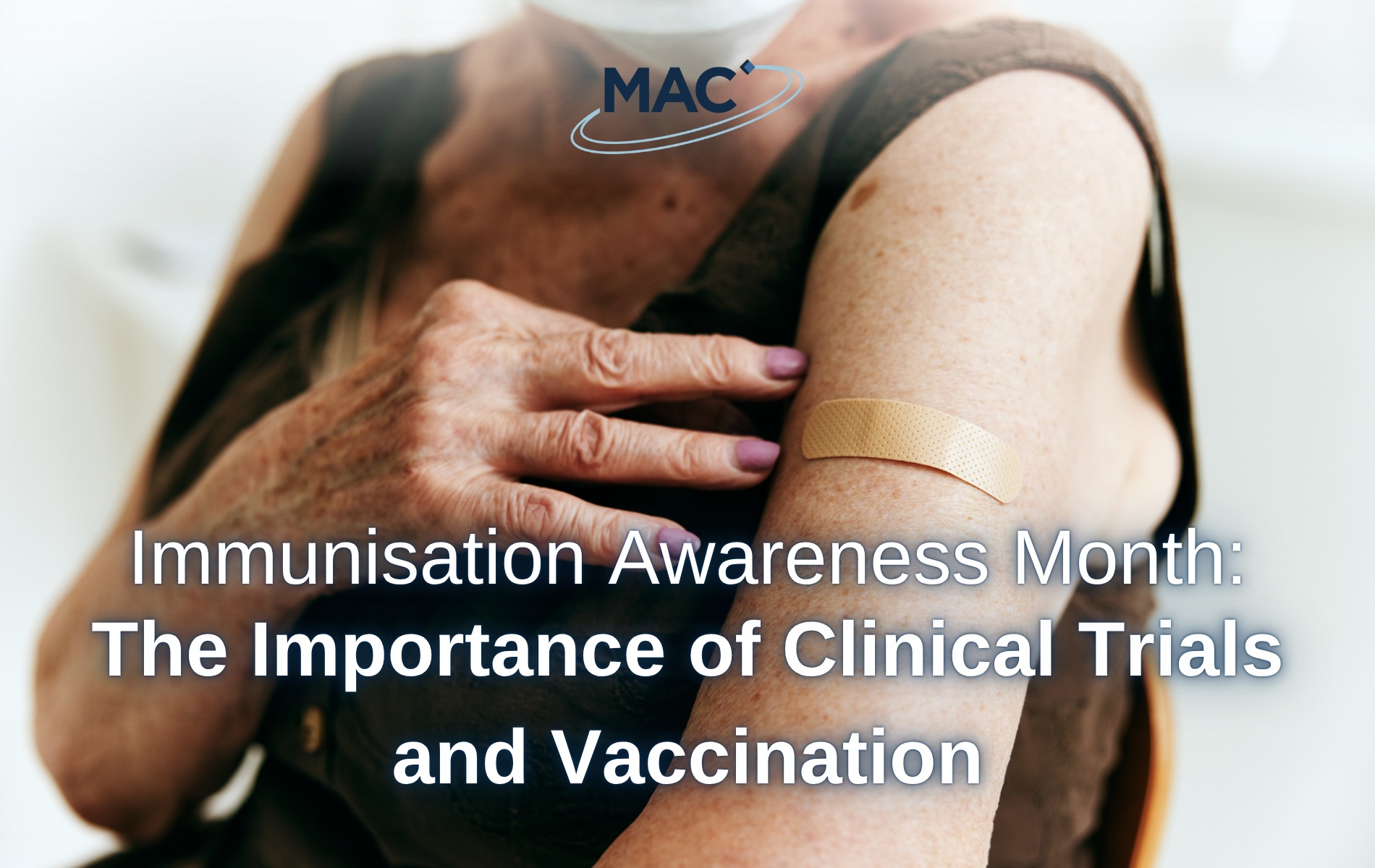This Immunisation Awareness Month, we are highlighting a very important part of immunity against disease—vaccination. Vaccination helps prevent the spread of many diseases and conditions, and their development could not be completed without clinical trials. Here at MAC, we’re exploring the critical role of vaccination in healthcare and how clinical research is vital to the development of new vaccines and treatments.
Vaccines and Immunisation
Vaccines are an effective way to protect you from harmful diseases. They use the body’s natural defences to build resistance against specific infections. This helps your immune system fight the infection if you contract it in the future and can protect you from more severe symptoms1.
Vaccines contain a dead or weakened form of an infection, which triggers your body’s immune system to react. Our immune system is designed to remember this, which means once exposed to germs through one or more doses of a vaccine, our body is protected for years. Rather than treating a disease after we get ill, vaccines can prevent us from getting sick in the first instance, or help ensure less severe symptoms1.
Vaccines have been used since at least the 15th century and have played a vital role in fighting diseases, from smallpox to COVID-19. WHO estimates that childhood vaccines alone save over 4 million lives every year2.
Clinical Trials and Vaccination
Clinical trials play a vital role in the development of vaccines. While many vaccines have been distributed across the world for decades, others need further investigation and testing and are not yet widely accessible worldwide.
All vaccines undergo strict testing, including clinical trials, before being licensed for use to ensure they are safe and effective. Clinical trials will also determine the optimum dosage to use3.
There are several steps for the development of a vaccine4.
1. Early development
Researchers may investigate many ideas of potential vaccines during the early stage of their development; this often takes 10-15 years of laboratory research.
2. Animal testing
After the initial research and discovery, the vaccine may be tested on animals first to test its ability to cause an immune response. At this stage, researchers may adjust the vaccine to make it more effective.
3. Clinical trials
If the vaccine performs well in the previous step, it passes on to the clinical trial stage. Here, the vaccine is tested on human volunteers in strictly controlled clinical research trials. There are several phases of vaccine clinical trials to ensure the safety and efficacy of the vaccine. Even after being licensed for the general population, it is still closely monitored.
If the vaccine shows a positive outcome during the trials, then it may be approved by officials such as MHRA and FDA and be manufactured for use. The development of a vaccine could take decades; however, in emergency circumstances, such as the COVID-19 pandemic, emergency approvals and vaccination campaigns can be initiated5.
Clinical Trials and New Treatments
New treatments cannot be introduced without clinical trials that test their safety and effectiveness. One important early example of a clinical trial is the 1747 scurvy trial conducted by James Lind, in which he discovered the positive effect of citrus fruits on scurvy symptoms6.
Clinical trials are now viewed as a standard method for the evaluation of healthcare interventions compared to observational studies. They are widely performed in the NHS and other private clinical research organisations such as MAC.
The benefits of clinical trials include7:
1. They can help develop treatments for rare diseases.
2. They can identify potential new treatments for diseases and conditions.
3. They ensure the safety and efficacy of new medications and treatments.
4. They can further our understanding of the underlying biology of diseases.
5. They can help lower the cost of healthcare.
Additionally, clinical trials can help assess the effectiveness of treatments already on the market, as not everyone receives the same benefits. In some cases, clinical trials can also be conducted on existing medications for new therapeutic purposes, which is called drug repositioning8.
Are you interested in taking part in a clinical trial?
MAC Clinical Research is conducting new studies for potential treatments, but we need your help. If eligible, you may receive payment for your time and commitment plus reasonable travel expenses.
You may be making a positive contribution to the health of future generations. Learn more via our studies webpage.
References
- WHO – Vaccines and immunization: What is vaccination?
- WHO – A Brief History of Vaccination
- BBC – Clinical Trials of Vaccines and Drugs
- CDC – How Vaccines are Developed and Approved to Use
- Kalinke, U. et al – Clinical Development and Approvals of COVID-19 vaccines
- BBC – James Lind: The man who helped to cure scurvy with lemons
- National Institute for Health and Care Research – Clinical Trials Guide | NIHR
- Pushpakom, S. et al – Drug Repurposing: Progress, Challenges and Recommendations




